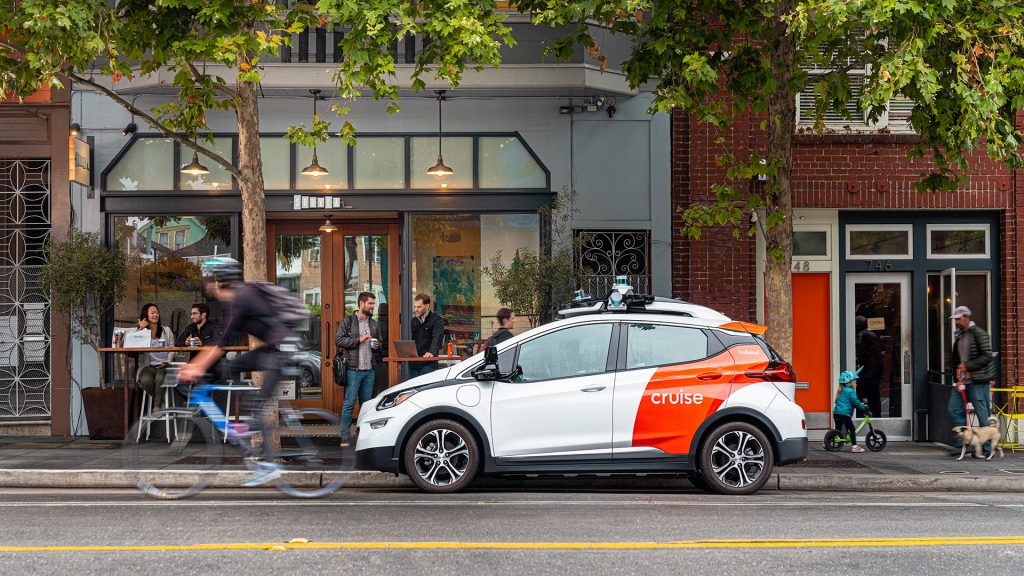General Motors (GM) is suing the city of San Francisco for allegedly taxing the automaker unfairly by using its self-driving unit Cruise to subject the company to $108 million in taxes over a seven-year period.
Last week, GM filed a lawsuit against San Francisco — dubbed General Motors Co. v. City and County of San Francisco — claiming that the Northern California city used its subsidiary Cruise to link its taxes to the automaker’s worldwide revenue (via Automotive News). Doing so resulted in over $3 billion of GM’s revenue becoming subject to San Francisco taxes, although the automaker argued that Cruise is completely separate from the parent company.
In addition, GM said that it shouldn’t be subject to the tax since Cruise only began making a small amount of revenue last year.
“GM’s core automotive business does not employ anyone in the city, has no plants or other physical locations in the city, has no dealerships in the city, and sells only a de minimis amount of retail goods (approximately $677,000 in 2022) in the city,” the automaker wrote in the complaint.
The automaker also noted that many of its employees work remotely from outside of San Francisco, despite the city being home to Cruise’s initial driverless operations.
Beyond the tax refund of $108 million, GM is requesting the recovery of $13 million in interest and penalties. The automaker also said in its complaint that California mandates that taxes should “fairly reflect” business conducted in a given city, adding that San Francisco’s taxation of Cruise was “inherently distortive.”
Following the filing, a San Francisco attorney said that the case was being reviewed, adding that the city would respond in court.
The news comes after a long series of bad news for Cruise throughout the latter half of this year, much of which revolves around an accident in early October in which one of the company’s self-driving vehicles hit and pinned a pedestrian after she had been struck by another vehicle with a human driver.
(1/3) The most important thing for us right now is to take steps to rebuild public trust. Part of this involves taking a hard look inwards and at how we do work at Cruise, even if it means doing things that are uncomfortable or difficult.
— cruise (@Cruise) October 27, 2023
Following the incident, the California Department of Motor Vehicles (DMV) immediately revoked Cruise’s license to operate driverless vehicles, and the company has been facing both federal and state investigations.
Although Cruise had been planning to roll out test vehicles in cities across the U.S., those plans were put on pause after the San Francisco accident. Cruise also recalled almost 1,000 of its Chevy Bolt self-driving cars due to the failure of the vehicle’s post-crash response in the October 2 incident.
Additionally, GM halted production of the Cruise Origin self-driving van, former CEO Kyle Vogt resigned alongside other executives, and more recently, the company terminated nine prominent project leaders as part of a larger, 24-percent reduction in total staff.
Cruise announces reduced operations, further delays to Origin production
What are your thoughts? Let me know at zach@teslarati.com, find me on X at @zacharyvisconti, or send your tips to us at tips@teslarati.com.


buy ivermectin 12 mg for humans – oral tegretol order carbamazepine generic
isotretinoin 10mg drug – accutane 40mg over the counter buy zyvox 600 mg sale
buy zithromax 250mg online cheap – order generic zithromax 250mg buy nebivolol 5mg without prescription
buy omnacortil 40mg without prescription – prometrium 200mg pill oral progesterone
buy omnacortil 5mg for sale – progesterone brand oral prometrium 100mg
order neurontin 600mg without prescription – sporanox 100mg for sale itraconazole drug
oral neurontin 600mg – itraconazole 100mg canada order itraconazole 100mg for sale
purchase lasix without prescription – buy betamethasone 20gm3 generic betamethasone 20gm
lasix 40mg pills – piracetam 800mg cheap betnovate 20gm generic
acticlate cheap – buy acticlate without prescription brand glucotrol 10mg
order augmentin 375mg pills – brand nizoral duloxetine canada
tizanidine canada – microzide 25mg for sale microzide pill
buy viagra 50mg pill – viagra 100mg buy generic tadalafil 10mg
viagra sildenafil 25mg – cialis 20mg us cialis dosage 40 mg
buy cialis tablets – cost tadalafil 20mg viagra mail order
Your post offers some great insights and helpful advice. Thanks for sharing your knowledge with us.
cenforce us – chloroquine order online order glycomet online
cenforce 100mg drug – cenforce pills purchase glucophage
buy lipitor for sale – zestril 2.5mg tablet prinivil usa
buy cheap generic omeprazole – brand prilosec atenolol generic
desloratadine 5mg drug – order claritin 10mg sale order dapoxetine 60mg without prescription
buy generic clarinex for sale – desloratadine online order buy dapoxetine 30mg sale
order cytotec 200mcg pills – buy diltiazem online cheap diltiazem 180mg without prescription
misoprostol over the counter – where to buy orlistat without a prescription diltiazem 180mg uk
buy acyclovir 400mg online cheap – allopurinol 100mg brand crestor 10mg for sale
acyclovir 400mg us – buy acyclovir 400mg pill buy rosuvastatin online
buy domperidone 10mg pills – flexeril 15mg price brand flexeril
domperidone pill – order cyclobenzaprine pills order flexeril sale
order domperidone 10mg sale – motilium 10mg pill flexeril 15mg without prescription
order inderal 10mg online cheap – purchase clopidogrel online where to buy methotrexate without a prescription
propranolol tablet – order methotrexate 5mg for sale purchase methotrexate sale
buy generic warfarin 2mg – warfarin pills buy losartan generic
purchase medex pills – buy generic cozaar order hyzaar generic
buy nexium 40mg – order imitrex 50mg online cheap imitrex 25mg pills
order levofloxacin 250mg pills – levaquin drug cost zantac 300mg
mobic 7.5mg pill – purchase flomax pill order tamsulosin 0.4mg generic
cost ondansetron – order aldactone 25mg pills buy generic simvastatin over the counter
provigil brand provigil without prescription buy modafinil 100mg pill modafinil medication buy generic modafinil purchase modafinil sale order provigil 100mg
modafinil 200mg generic buy modafinil online order provigil 200mg online brand provigil brand modafinil provigil 100mg over the counter buy generic provigil 200mg